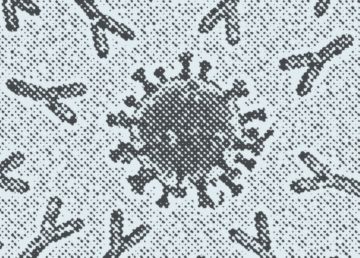John Hewitt in Inference:
 Variants in the SARS-CoV-2 virus control infectivity, severity, and immunity by changing tissue tropism, innate responses, and adaptive antibody generation. Although the emergence of escape mutations can see the virus spread rapidly, regardless of vaccination or antibody status, new combination therapies that strike at its heart will complement vaccinations and provide a defense the virus cannot outsmart.
Variants in the SARS-CoV-2 virus control infectivity, severity, and immunity by changing tissue tropism, innate responses, and adaptive antibody generation. Although the emergence of escape mutations can see the virus spread rapidly, regardless of vaccination or antibody status, new combination therapies that strike at its heart will complement vaccinations and provide a defense the virus cannot outsmart.
One of the first treatments developed for patients severely affected with COVID-19 involved the administration of convalescent plasma. This treatment did not progress past the testing phase after a clinical trial in the US demonstrated that there was little evidence of any impact on the virus.1 The antibody spectrum of plasma may be diverse, but it is also complicated and, in many situations, dangerous to administer. In its stead, researchers are developing man-made monoclonal antibodies to target the virus with pinpoint accuracy. While still in experimental form, they can often be administered under an emergency use authorization.
Combination antibody therapies, such as the pairing of bamlanivimab and etesevimab, have been shown to wield considerable power against the virus. But they are already becoming obsolete in the face of escape variants conjured up by new strains. These treatments will remain part of the clinical arsenal, but a demonstrated lack of in-vitro activity against a threatening B.1.351 strain indicates that we have arrived at a new stage of viral warfare.
More here.
